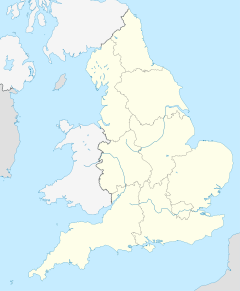Blackburn
| Blackburn | |||
|---|---|---|---|
|
|
|||
| Coordinates | 53 ° 45 ′ N , 2 ° 29 ′ W | ||
|
|
|||
| Residents | 117,963 (as of 2011) | ||
| administration | |||
| Part of the country | England | ||
| Shire county | Lancashire | ||
| Unitary authority | Blackburn with Darwen | ||
Blackburn is a town in the Unitary Authority Blackburn with Darwen in the county of Lancashire in north-west England and has 117,963 inhabitants (2011).
history
The name of the city is derived from the river Blakewater , a tributary of the River Darwen , which also flows through the city . The name comes from the time after the Romans withdrew from Britain ; but the place existed before. The Roman road that linked Manchester to Ribchester ran through him . The location on this road made Blackburn the most important place in north-east Lancashire during the time of the Danes and Saxons and was known as Blackburn hundreds .
In the Domesday Book of 1086 Blackburn is recorded with the church of Saint Mary; it is believed that the first church was built as early as 596. In 1996 the 1400th anniversary of Christianization was celebrated. The current church was consecrated in 1826 and became Blackburn Cathedral in 1926 after Blackburn was promoted to diocese .
The industrial revolution changed Blackburn. In 1750 the city was no more than a village, but by 1850 the population had increased tenfold. Blackburn became the world's cotton mill center . With the completion of the Leeds and Liverpool Canal in 1816 and the connection to the railroad in 1846, the cost of transporting cotton imported from the USA dropped significantly; this caused a further expansion of both the city and the local industry.
Blackburn has long been a center of football . The Blackburn Olympic club, which only existed from 1878 to 1889, won the FA Cup in 1883 . The Blackburn Rovers , founded in 1875, won the cup six times between 1884 and 1928 and the English championship title in 1995. Their player William Townley worked as a coach in the first half of the 20th century and was one of the most important pioneers of football in Germany.
In the 20th century, the textile industry shrank , and mechanical engineering and electronics companies took its place. Since 1997 Blackburn has been connected to the British motorway network via the M65 motorway . In the area around the city, oil is obtained by fracking . This caused several light earthquakes.
Blackburn's industry attracted large numbers of immigrants , with many Irish coming to the city at the beginning of the 20th century and many Poles and Ukrainians moving to Blackburn after the Second World War ; In the last 30 years the proportion of Indian and Pakistani residents has grown. The city's Muslim population is 25%, making it the highest in any of the United Kingdom outside of London . There are 52 mosques in the city .
Blackburn is twinned with Altena ( North Rhine-Westphalia ), Pegnitz ( Bavaria ) and Péronne ( France ).
sons and daughters of the town
- William Townley (1866–1950), football player and coach
- Alfred Wainwright (1907–1991), author and illustrator
- Ronald Stevenson (1928–2015), composer and pianist
- Keith Duckworth (1933-2005), engineer
- Ian McShane (born 1942), actor
- Peter John Haworth Doyle (born 1944), Catholic emeritus Bishop of Northampton
- Alan Williams SM (born 1951), Catholic Bishop of Brentwood
- Michael Winterbottom (* 1961), film director
- Carl Fogarty (* 1965), motorcycle racer
- Will Greenwood (born 1972), rugby player
- Farakh Ajaib (* 1991), snooker player
- Diana Vickers (* 1991), singer and actress
Trivia
Blackburn is mentioned in the Beatles' song A Day in the Life . An article in the Daily Mail about the plan to fill potholes there, which John Lennon read when he wrote the song, inspired him to write “I read the news today oh boy / 4,000 holes in Blackburn, Lancashire / And though the holes were rather small / They had to count them all / Now they know how many holes it takes to fill the Albert Hall. "


